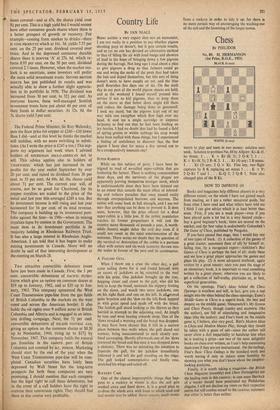Chess
BY PHILIDOR
No. 89. H. HERMANSON (1st Prize, B.O.E., 1953)
BLACK (8 men) WHITE (8 men) WHITE to play and mate in two moves: solution next week. Solution to problem No. 88 by Allport Kt-K 4!, no threat. 1 . . . K x Kt (K 3); 2 Q-K 7. 1 . . . K x Kt (K 5); 2 R-K 3. I ... Kt (4) any; 2 B mates.
1 . . . Kt (3) any; 2 Q x Kt. Fine key, two flight captures by B K replacing set mates 1 . K x P; 2 Q-Kt 7 and 1 . . . K-Q 3; 2 Q-B 7. Note also changed pins of the B Kt.
HOW TO IMPROVE (4)
Books and magazines help different players to a very different extent; on the whole I have not gained much from reading, so I am a rather unnatural guide, but from what 1 have read and what others have told me I think I can give advice which is at least better than none. First, if you are a weak player—even if you have played quite a lot but in a very limited circle— buy a good beginner's book; there are several on the market, and the best value is undoubtedly Golombek's The Game of Chess, published by Penguins.
If you have passed that stage, then I would buy one of two types of book. (1) A collection of the games of a great master, annotated (best of all) by himself or, failing that, by a recognised expert—Alekhine's Best Games of Chess is perhaps the best of all; study these and sec how a great' player approaches the games and plans his play. (2)- A more advanced textbook, again written by a great master; once you pass the stage of an elementary book, it is important to read something written by a great player, otherwise you arc likely to get a collection of half-truths, platitudes or, at best, superficial generalities.
On the openings, Fine's Ideas behind the Chess Openings is excellent and will, in fact, give you a real insight into the ideas behind the chess openings; Euwe's Middle Game in Chess is a superb book, the best and deepest on the middle game; Nimzowitch's My System and Chess Praxis, though cranky and eccentric (like the author), are full of stimulating and imaginative ideas (like the author); and Fine's book on the middle game is, I believe, also very good. Mrs Modern Ideas in Chess and Modern Master Play, though they should be taken with a grain of salt—since the author will never allow a dull impartiality to handicap him when he is making a point—are two of the most delightful books on chess ever written, so I can't help mentioning them even if they are not instructional. On the endings, Fine's Basic Chess Endings is the standard work and worth having if only to induce some humility by showing you what you don't know about the simplest- looking positions. Finally, it is worth taking a magazine—the British Chess Magazine (monthly) and Chess (fortnightly) are the leading ones in this country; in case some Sherlock of a reader should have penetrated my Philidorian disguise, I will not disclose my views on their respective merits but will confine myself to the cautious statement that either is better than neither.


































 Previous page
Previous page